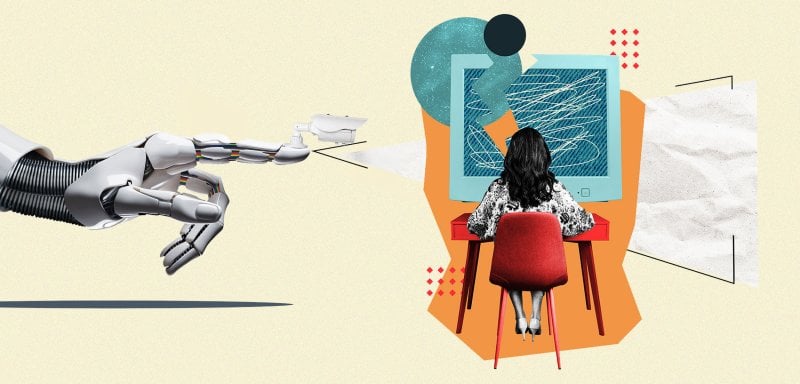Artificial intelligence (AI) is transforming every aspect of our lives at a speed unlike anything we’ve seen before. This technology, which has been imported to our region without any understanding of our culture, relies on systems that work to repress us. While it promises enormous innovation and opportunity, it also brings unprecedented threats to our freedoms, rights, and the very fabric of our societies.
Gaza has shown us that AI can be weaponized to annihilate entire populations.
For development, humanitarian, and human rights organizations, AI holds a future we should fear—but only if we are unprepared.
In the Middle East and North Africa, the most unequal and water-scarce region in the world, with the highest youth unemployment and the lowest female labor force participation, AI is learning from a flawed baseline built on patriarchal norms, colonial legacies, racial bias, and structural discrimination that is embedded in our data, institutions, and social systems.
It is owned and deployed by platforms and entities that infringe on ourrights; surveilling, repressing, and spreading propaganda and fear. It is completely devoid of feminist understanding or rights-based governance, giving oppressive governments and bad-faith actors free rein to shape it.
AI technology, which has been imported to our region without any understanding of our culture, relies on systems that work to repress us. While it promises enormous innovation and opportunity, it also brings unprecedented threats to our freedoms, rights, and the very fabric of our societies.
Non-governmental organizations are not known for their nimbleness. I fear we may not be agile enough to adapt at the pace at which this technology is shaping our world. From Israel’s genocide in Gaza to the reinforcement of harmful gender norms, we can already see the repercussions AI can have on the communities we serve. No area of our work will be untouched by its reach.
Unless feminist, decolonial, and community-led voices shape AI development from the outset, feminism, gender and economic justice, digital and human rights, and good governance will all be profoundly affected, as this technology is increasingly used to entrench inequalities, police identities, and reinforce patriarchy.
Women and marginalized communities in the region are in a particularly vulnerable situation. AI bias erases and stereotypes them, heightening risk as gender-based violence is amplified through AI-driven platforms. Surveillance technologies target women and LGBTQIA+ activists, while gender-normative systems continue to exclude women from the workforce.
However, while AI can deepen inequalities and further restrict rights, we cannot ignore its innovation potential. How can we harness AI to amplify voices rather than silence them?
In the MENA, the most unequal and water-scarce region in the world, AI is learning from a flawed baseline built on patriarchal norms, colonial legacies, racial bias, and structural discrimination that is embedded in our data, institutions, and social systems.
AI must be engaged through the lens of rights, ethics, and governance. We must be able to shape debates, advocate for ethical frameworks, and develop systemic protections that safeguard vulnerable communities while ensuring everyone’s freedoms.
We are facing an era where our advocacy will target machines, and the international frameworks we have operated within for decades are both woefully outdated and no match for the myriad issues AI has unleashed.
Governments and civil society must work together to create new mechanisms to fully understand the threats to the most vulnerable and protect against the misuse of these technologies everywhere. Gaza has shown us that AI can be weaponized to annihilate entire populations.
We must learn to build meaningful advocacy work that bans autonomous weapons systems, mass surveillance, and other discriminatory technologies, while also building social movements in the face of evaporating privacy rights. We must reclaim activism and learn to design alternative AI models to meet this emerging super intelligence with another that has learnt from us and is grounded in our ethics and our values.
Women and marginalized communities in the region are in a particularly vulnerable situation. AI bias erases and stereotypes them, heightening risk as gender-based violence is amplified through AI-driven platforms. Surveillance technologies target women and LGBTQIA+ activists, while gender-normative systems continue to exclude women from the workforce.
We are facing the dawn of a new type of inequality—this time a digital one, and we must be ready. Feminist and rights movements, and other NGOs, must become literate in the language of AI and be proactive in shaping it across the region.
If we fail to act now, AI will deepen the divides we are fighting so hard to close. But if we engage collectively, pressure our governments to ensure their frameworks are regulated and ethical, and invest in innovations that entrench feminist digital justice equitably, it can still become a force for good.
** The views and opinions expressed in this article are those of the author’s and do not necessarily reflect the official policy or position of Raseef22
Raseef22 is a not for profit entity. Our focus is on quality journalism. Every contribution to the NasRaseef membership goes directly towards journalism production. We stand independent, not accepting corporate sponsorships, sponsored content or political funding.
Support our mission to keep Raseef22 available to all readers by clicking here!
Interested in writing with us? Check our pitch process here!





